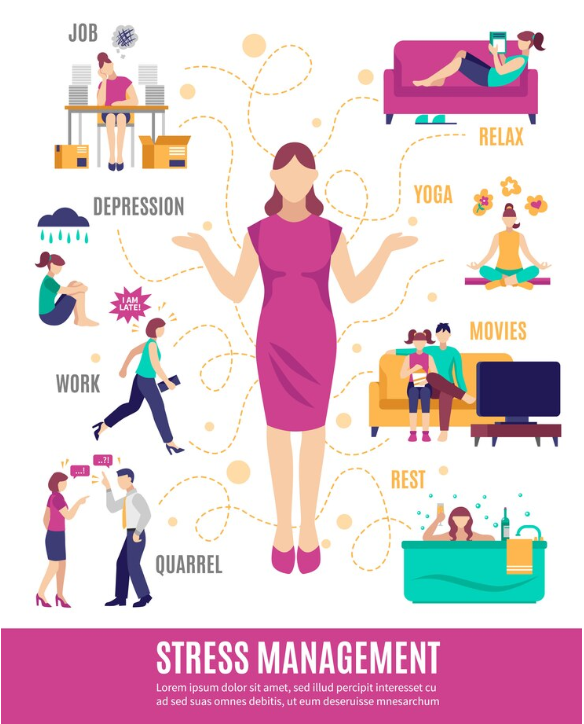7 Steps of Stress Management for Teens
Why Are Teens So Stressed?
Teenage years can be exhilarating yet stressful as teens navigate academic pressures, social dynamics, and the quest for self-identity, all while facing the influence of technology and societal expectations. Common stressors include:

- Academic Pressure: Performance expectations from parents, teachers, and peers can be overwhelming.
- Social Challenges: Peer pressure, social media, and relationship issues can impact mental well-being.
- Family Dynamics: Family conflicts, financial issues, and parental expectations can add stress.
- Hormonal Changes: Adolescence brings hormonal fluctuations that affect mood and emotions.
- Identity and Self-Esteem: Navigating self-identity amid bullying, discrimination, and societal expectations can lead to low self-esteem.
- Uncertainty about the Future: Concerns about career paths, independence, and adulthood are common.
- Technology Overload: Constant connectivity, cyberbullying, and information overload heighten anxiety.
Symptoms of Elevated Stress in Teenagers
Stress manifests differently for everyone, but common signs include:
- Physical Symptoms: Headaches, digestive issues, muscle tension, fatigue, sleep disturbances, appetite changes.
- Emotional Symptoms: Mood swings, anxiety, depression, irritability, low self-esteem, sensitivity to criticism.
- Behavioral Symptoms: Social withdrawal, risky behavior, time management issues, restlessness, loss of interest in activities.
- Cognitive Symptoms: Racing thoughts, obsessive worry, memory issues, concentration difficulties, negative thinking.
Statistics on Teenage Stress
Teen stress is widespread, with 65% of adolescents experiencing moderate symptoms and 9% reporting high levels of stress. According to the World Health Organization (WHO):
- Anxiety Disorders affect 3.6% of 10–14-year-olds and 4.6% of 15–19-year-olds.
- Major Depression affects 1.1% of 10–14-year-olds and 2.8% of 15–19-year-olds.
Chronic stress not only impacts daily life but can also increase the risk of developing mental and physical health disorders that persist into adulthood.
Long-Term Risks of Chronic Stress
Prolonged stress weakens coping skills, impairs cognitive and immune functions, and elevates the risk of cardiovascular and chronic health conditions. It can also lead to behavioral issues such as substance abuse and overeating, further affecting physical and mental health. Social isolation, strained relationships, and impaired academic performance are additional concerns for stressed teens.
7 Steps to Managing Stress for Teens
1. Practice Mindfulness and Meditation
Mindfulness techniques, such as deep breathing and meditation, can reduce stress by focusing on the present moment without judgment.[1] This builds resilience against anxiety and emotional distress.
2. Exercise Regularly
Physical activity releases endorphins, boosting mood and reducing stress.[2] Teens can benefit from activities like jogging, yoga, sports, or dancing to improve mental and physical well-being.
3. Maintain Healthy Habits
Balanced nutrition, adequate sleep, and limited caffeine or screen time provide a strong foundation for coping with stress. Prioritizing health equips the mind and body to manage challenges more effectively.
4. Establish Healthy Boundaries
Setting personal boundaries in relationships and taking time for self-care help reduce stress. Engaging in hobbies, relaxation techniques, and setting limits on technology use can create balance.
5. Connect with Others
Strong social connections provide emotional support during challenging times. Encourage open conversations with trusted friends, family members, or support groups to process feelings and gain perspective.
6. Practice Time Management
Overloaded schedules increase stress. Prioritizing tasks, breaking down projects, and scheduling regular breaks can reduce overwhelm and promote a sense of control. A daily routine helps maintain balance.
7. Seek Professional Help When Needed
If stress persists despite coping strategies, a mental health professional can provide tailored support. Therapy, counseling, or group programs offer effective strategies for managing stress and developing healthy coping skills.
How to Get Help for Stress
Supportive parenting creates a nurturing environment for teens to express their concerns. Professional help, such as individual therapy or counseling, offers personalized guidance. Group therapy also fosters connection, allowing teens to share experiences and learn coping strategies from peers.
Normalizing stress experiences and promoting open communication can help teens navigate challenges with confidence and resilience.







